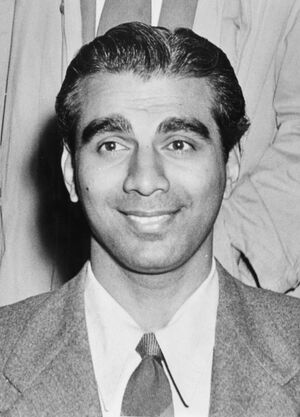Cheddi Jagan
( politician) | |
|---|---|
 | |
| Born | 1918-03-22 Port Mourant, East Berbice-Corentyne, British Guiana |
| Died | 1997-03-06 (Age 78) Washington DC, United States |
Cause of death | |
| Alma mater | • Howard University • Northwestern University |
| Religion | |
| Spouse | Janet Rosenberg |
| Party | People's Progressive Party |
Cheddi Berret Jagan was a Guyanese (then a British colony) politician who was first elected Chief Minister in 1953, before he was removed by the British military; and later Prime Minister of British Guiana from 1961 to 1964. He was removed from power by a joint large-scale election interference by the CIA[1] and Britain. He later was President of Guyana from 1992 to 1997.
Background
Cheddi Berret (Bharat) Jagan was born on 22 March 1918 in Ankerville, Port Mourant, a rural village. He was the eldest of 11 children. His parents were Indo-Guyanesese who were Hindus[2] that immigrated from British India to British Guiana as indentured labourers, and made up around half the population.
Political career
Jagan co-founded the Political Affairs Committee (PAC) in 1946, and was subsequently elected to the Legislative Council in November 1947 as an independent candidate from Central Demerara constituency. On 1 January 1950, the People's Progressive Party (PPP) was founded by a merger of the PAC and the British Guiana Labour Party (BGLP), with Jagan as its leader and former BGLP leader Forbes Burnham as its chairman.[3]
Jagan won elections in 1953. However, Winston Churchill was alarmed by fears that Jagan was a Marxist-Leninist, and was convinced Jagan could allow the Soviet Union a foothold in South America. In fact, there is no evidence whatsoever that Jagan had any ties to any foreign communist or revolutionary groups. But still, the fears prompted a British military intervention only days after his victory.[4] The British abolished his office of chief minister and for seven years kept Guiana under military occupation. Jagan they made a political prisoner.[1]
As early as mid-1962, JFK informed the British prime minister that the notion of an independent state led by Jagan “disturbs us seriously,” adding: “We must be entirely frank in saying that we simply cannot afford to see another Castro-type regime established in this Hemisphere. It follows that we should set as our objective an independent British Guiana under some other leader.”[1]
After a PPP victory in the August 1961 elections, Jagan became Chief Minister for a second time, serving for three years.
The CIA's Western Hemisphere (WH) Division of the operations directorate contiued the effort. Western Hemisphere was under long-time chief Joseph C. King. The branch of WH responsible for British Guiana was under another long-service veteran, Virginia Hall Goillot, who wrestled with the need to create an apparatus for regime change.”[1]
Despite the CIA operation to create unrest and finance the opposition, in the December 1964 elections, the PPP won a plurality of votes. But after heavy gerrymandering, Burnham's party, the People's National Congress, and the conservative United Force held a majority of seats. The British governor of Guiana insisted on offering Burnham alone the chance to compose a coalition.[3][1]
Burnham ruled until 1985 through use of heavy election fraud, winning a 1978 election with 97% of the vote.
Later life
After 28 years in opposition, the PPP won the 5 October 1992 elections with about 54% of the vote, and Jagan became President. Contrary to earlier foreign fears, he governed as a democratic socialist and not a Marxist–Leninist.[5]
Jagan suffered a heart attack while in office, on 15 February 1997 and was taken to Georgetown Hospital before being flown by U.S. military aircraft then by U.S. Air Force helicopter from Andrews Air Force Base[6] to Walter Reed Army Hospital in Washington, D.C., later that day.[7][6] He underwent heart surgery there and died in Washington on 6 March 1997, 16 days before his 79th birthday. Prime Minister Sam Hinds succeeded him as President and declared six days of mourning, describing Jagan as the "greatest son and patriot that has ever walked this land".[7]
References
- ↑ Jump up to: a b c d e https://nsarchive.gwu.edu/briefing-book/intelligence/2020-04-06/cia-covert-operations-overthrow-cheddi-jagan-british-guiana-1964
- ↑ https://books.google.com/books?id=p8dixDGhJ3sC&q=kurmi+guyana&pg=PT392
- ↑ Jump up to: a b History of the PPP, PPP website.
- ↑ http://www.guyana.org/govt/declassified_british_documents_1953.html
- ↑ "Cheddi Jagan Elected As Guyana's President", The New York Times, 8 October 1992.
- ↑ Jump up to: a b "In the Americas", The Miami Herald (nl.newsbank.com), 16 February 1997.
- ↑ Jump up to: a b https://query.nytimes.com/gst/fullpage.html?res=9C02E2DA1030F934A35750C0A961958260